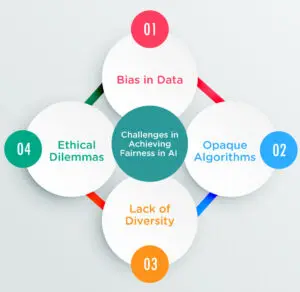The discussion around AI ethics and fairness is more influential than ever in the quickly developing field of artificial intelligence (AI). As AI technologies become integral to daily life, ensuring their ethical and fair use is vital for building trust in technology and protecting societal values. In this post we understand why AI ethics matter, the difficulties in attaining justice, as well as doable actions to promote accountability and transparency.
Why AI Ethics and Fairness Matter?
AI holds immense potential to revolutionize industries, improve decision-making, and solve complex problems. However, its transformative power also brings ethical dilemmas. Biased algorithms, lack of accountability, and privacy concerns can lead to distrust and harm marginalized communities.
For example, in healthcare, AI systems designed to diagnose diseases must ensure impartiality to provide equal access to quality care. Without AI Ethics and Fairness, such tools could inadvertently reinforce existing inequalities. Upholding fairness is critical to creating systems that benefit everyone and do not perpetuate bias or discrimination.
Key Challenges in Achieving Fairness:
Despite its promise, achieving fairness in AI systems is a complex task. Below are the primary challenges:
- Bias in Data
AI models rely heavily on the data used to train them. If biases from the past are present in this data, the AI will pick them up and magnify them. For instance, an AI recruitment tool trained on data from a male-dominated workforce may unintentionally favor male candidates.
- Opaque Algorithms
Some AI systems, particularly those using deep learning, are “black boxes” — their decision-making processes are not transparent. This opacity makes it difficult to identify and correct unethical practices.
- Lack of Diversity
The teams designing AI systems often lack diversity. This homogeneity can result in narrow perspectives and blind spots, reducing the fairness of AI-driven decisions.
- Ethical Dilemmas
AI applications often raise ethical questions. Should AI be allowed to make life-altering decisions, such as approving loans or determining guilt in legal systems? These situations demand careful consideration of the balance between automation and human judgment.
Practical Steps to Foster Trust in AI
Overcoming these challenges requires collaboration between developers, policymakers, and society at large. Here are actionable steps to prioritize AI Ethics and Fairness:
- Ensure Representative Data
To reduce biases, AI systems should be trained on a variety of datasets. Regular audits of the data can identify and address inconsistencies before they impact decision-making.
- Adopt Transparent Practices
Transparency is a cornerstone of ethical AI. Developers should openly communicate how AI models work, what data they use, and the reasoning behind their decisions. Explainable AI (XAI) is a promising approach to demystify complex algorithms.
- Implement Ethical Guidelines
Organizations must adopt ethical frameworks for AI development. These guidelines should cover data collection, decision-making processes, and potential consequences, ensuring systems align with societal values.
- Promote Inclusive Design
Fairer results may result from diverse AI development teams. Including individuals from varied backgrounds ensures a broader understanding of the potential impacts of AI systems on different groups.
- Regulate and Monitor AI
Governments and regulatory bodies should implement standards for ethical AI. Independent audits, regular monitoring, and penalties for non-compliance will encourage accountability.
The Role of Public Awareness
Educating the public about AI Ethics and Fairness is equally critical. When users understand how AI works and its limitations, they can hold organizations accountable. This awareness can also drive demand for fairer and more transparent technologies.
Moreover, collaboration between technologists and ethicists is essential. By integrating ethical considerations from the earliest stages of development, AI systems can align with principles of fairness and trustworthiness.
Looking Ahead: The Future of Ethical AI
As AI continues to shape society, embedding ethics and fairness in its foundation is non-negotiable. Avoiding harm is only one aspect of ethical AI; another is actively advancing equity and trust. When organizations prioritize AI Ethics and Fairness, they create technologies that serve humanity responsibly.
Although it may be difficult, the path to ethical AI is essential. By working together, we can ensure that technology benefits everyone, fostering a future where fairness and trust are at the forefront.
Building trust in technology starts with a commitment to ethical principles. We can capitalize on AI’s transformational potential while preserving society values by giving AI ethics and fairness top priority. This balance is crucial to building a future where technology works for all.
Read More:
Human-Centered AI: The Power of People-First Technology for a Better Tomorrow



